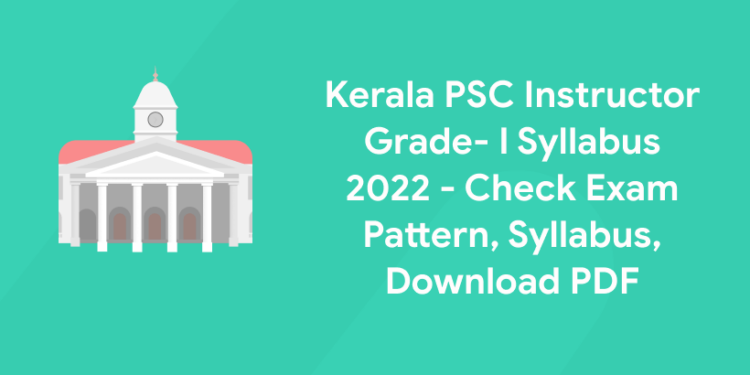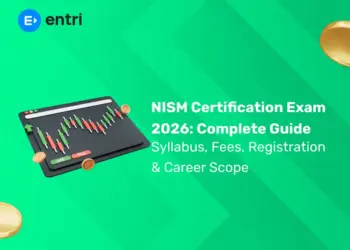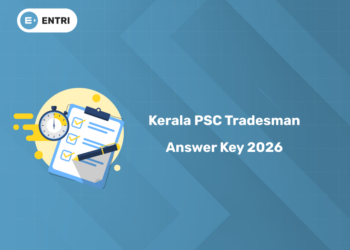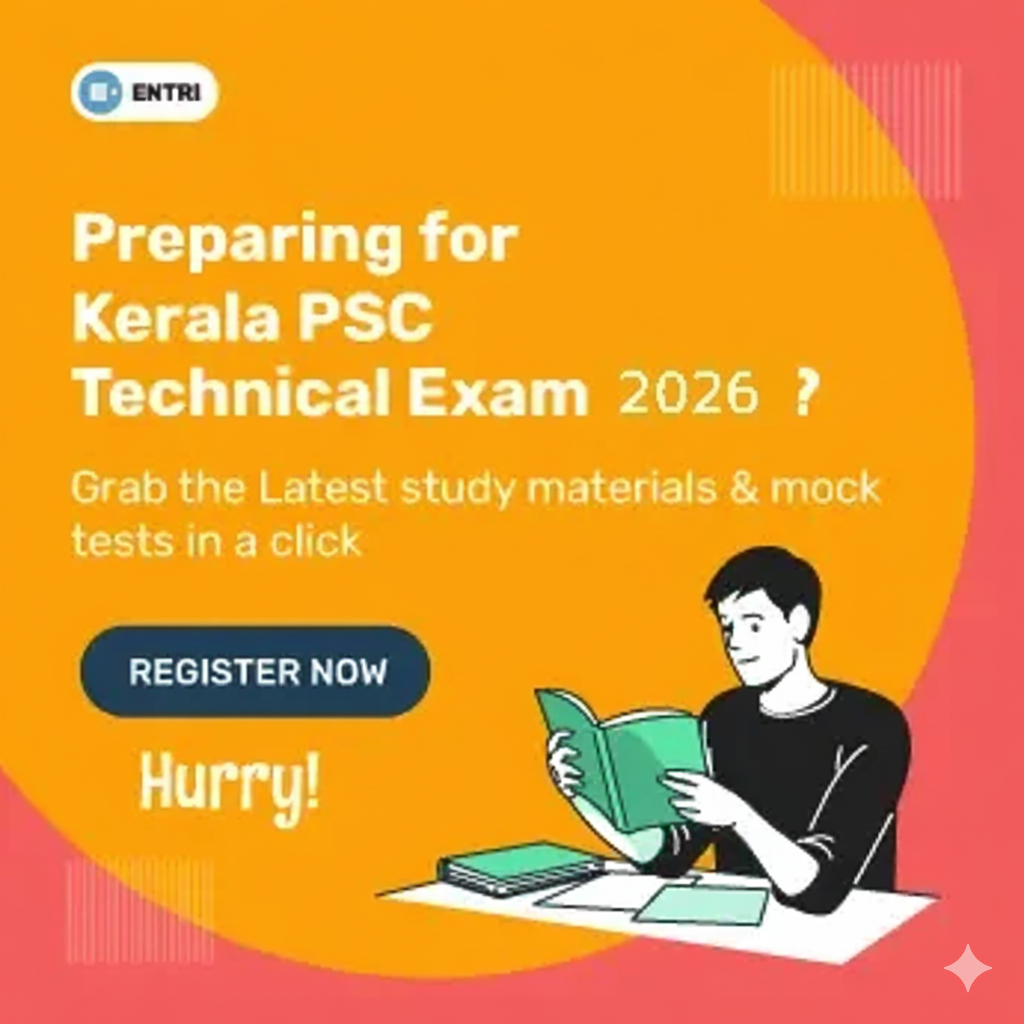Table of Contents
The Kerala Public Service Commission will recruit qualified applicants for the position of Instructor Grade- I under Category No.192/2020 in order to fill the two vacant positions. The Commission issued a formal notification in this regard on November 16, 2020. Direct recruiting will be used to choose the qualified applicants. Candidates with a maximum age of 44 may apply. For additional information, go to the Kerala Public Service Commission’s website at www.keralapsc.gov.in.
This article includes the whole syllabus for this recruitment as well as the most recent updates to the exam format. To gain a full overview of the Kerala PSC Instructor Grade-I Exam pattern and Syllabus, read the article.
Kerala PSC Instructor Grade- I 2022 – Overview
| Particulars | Details |
| Name of the Organization | Kerala Public Service Commission (KPSC) |
| Post Name | Instructor Grade- I (Chemical Engineering) |
| Name of Department | Technical Education |
| Category | Syllabus |
| Method of Appointment | Direct Recruitment |
| Age limit | 20-44 Years |
| Official Website | keralapsc.gov.in |
Kerala PSC Instructor Grade- I 2022 – Exam Pattern
1: Between the period of 1858-1947, how many Viceroys ruled over India?
This section contains complete information on the Kerala PSC Instructor Grade-I Exam Pattern 2022 for all applicants for the aforementioned positions. The knowledge offered here will aid candidates in achieving higher test scores. This Kerala Instructor Grade- I Exam Pattern 2022 includes a variety of details that are helpful for preparation, such as the topic names, the number of questions, the total marks, and the time.
- Maximum Marks: 100
- Duration: 1 Hour 30 Minutes
- Medium of Question: English
- Mode of Exam: ONLINE (Objective Multiple Choice)
| Module | Subject | Marks |
| Module I | Fluid Mechanics | 20 Marks |
| Particle Technology | ||
| Module II | Stoichiometry | 20 Marks |
| Fuels & Combustion | ||
| Module III | Heat Transfer | 20 Marks |
| Mass Transfer | ||
| Module IV | 20 Marks | |
| Module V | Polymer Technology | 20 Marks |
| Environmental Engineering | ||
| Total | 100 Marks |
Prepare For Kerala PSC Exam – Download Entri App.
Prepare for Kerala PSC Technical Exams with Entri
സർക്കാർ ജോലി എന്ന സ്വപ്നം ഇനി സ്വപ്നം മാത്രമല്ല! Join Kerala's Top-rated PSC Coaching Programs
Join NowKerala PSC Instructor Grade- I 2022 – Syllabus
On this page, you may get the Kerala PSC Instructor Grade I Syllabus 2022. All candidates studying for the test should pay close attention to this Kerala PSC Syllabus 2022. Examine the Kerala PSC Instructor Grade- I Syllabus 2022, which has been provided for the benefit of applicants; then, check over the topics listed below and gather the necessary information.
Module I
Fluid Mechanics
- Density, Specific gravity, Viscosity, Newton’s law of viscosity, Newtonian and Non-Newtonian fluid, Viscosity Index, Red wood viscometer
- Absolute Pressure, Gauge Pressure, Total Pressure Liquid column Manometers – U Tube, Differential & Inclined Tube Manometers
- Viscous, Turbulent Flow, Critical Velocity, Reynolds Number, Transition range & Velocity distribution in pipes
- Transportation of fluids
- Pump Classifications
Particle Technology
- Filtration as a solid, liquid separation and its application in industry. Classification of filters
- Nature of the materials to be crushed – hardness, structure, moisture content, crushing
- Screens: Tyler and U. S. standard screens Screen analysis: efficiency and capacity of screens Types of screening equipment – grizzlies – trammels, shaking screens, vibrating screens Air separation methods: cyclone separator – air separator – bag filter. Electrostatic
- Mechanism of fluidization – conditions for fluidization – batch fluidization – boiling effect
- Sedimentation separation in liquid medium – batch sedimentation – application of batch – Principle of froth floatation cells – froth floatation cells – simple flow sheet for floatation plant
- Purpose of agitation – agitation equipment – propellers, paddles and turbines – Flow pattern in agitated vessels – prevention of swirling – draft tubes and baffles – their power consumption in agitated vessels – simple problems in determination of power.
- Storage of solids – Hoppers – bins – angle of repose. Devices for discharge of solids – Conveyor types – belt conveyor – chain conveyor – scraper conveyor – apron conveyor – screw conveyors – pneumatic conveyors – pneumatic conveying system auxiliary equipments Storage of liquid – storage tanks
Module II
Stoichiometry
- Units and dimensions, conversion of units, dimensionless group, chemical formulae, mass
- Ideal gases – gas laws (derivation is not required), simple problems involving single gas. Gas mixtures – Dalton’s Law, Amagat’s law, Volume %=mole% = partial pressure %. Average Material Balances – Not involving chemical reactions Types of processes – Material balances equations – key component – material balances problem
- Chemical reactions, complete and incomplete reactions, stoichiometric proportions of reactants
Fuels & Combustion
- Petroleum – fractional distillation – petroleum products – cracking – catalytic, thermal, hydrocracking – polymerisation – knocking agent – octane number – cetane number – removal of sulphur – gasoline, kerosene, LPG storage of liquid fuels.
- Solid fuels – classification – composition of wood – origin of coal – theories of origin of coal – ranking of low temperature carbonization – Storage of coal – Beehive oven – Otto Hoffman by product oven – composition, calorific value and uses of above gas fuels – blast furnace gas. Preparation of nuclear materials – preparation of nuclear material. Uranium, Thorium, Plutonium fuel.
- Properties and uses of coal for industrial purpose – Classification of furnaces – construction and working.
- Cooling and refrigeration – distillation – solar drying and cooking – working of silicon cell – conversion – Schematic diagram of OTEC – Geo thermal power – Geo thermal power station in India
Attempt free mock test to ace your Kerala PSC 2022 preparation
Module III
Heat Transfer
- Heat transfer by conduction in solids – steady state and unsteady state flow – definition – units of heat flow. Single wall – derivation of equation and simple problems – Thermal conductivity – units
- Transfer to fluid without phase change – thermal boundary layer – hydro dynamic boundary layers. Liquids – flash building sub cooled boiling – saturated boiling – regimes of boiling – maximum
- Calculation in heat exchangers – Heat transfer equipment – Heaters and heat exchangers – single pass shell floating head heaters – use of baffles on shell side of heat exchangers, double pipe heat exchangers – plate basis of classification – horizontal tube – vertical tube – climbing film – falling film – forced circulation
- Area – capacity – steam economy – factors that control heat transfer coefficient and effect of hydrostatic method of feeding – advantages of multiple effect evaporation – steam economy and capacity. – simple problems in determining concentration and temperature in each effect – industrial uses – optimum temperature differences – incorporating heat pump cycle in evaporation of fruit.
Mass Transfer
- Molecular diffusion – molar flux – Fick’s rate equation – steady state diffusion of gas A
- Mechanism of Absorption – conditions of equilibrium between gas and liquid – Henry’s law
- General mechanism of diffusional processes – Definitions and mathematical expressions for Adiabatic saturation temperature – wet bulb temp cooling towers – atmospheric – natural
- Purpose and industrial applications – drying equipment – classifications – tray dryer – tunnel
- Distillation as an interphase mass transfer – industrial application – definition of terms – less
- Rectification, Azeotropic distillation, extractive distillation, and molecular distillation, rectification
- Applications of leaching – batch and continuous – heap leaching – percolation tanks – shank
Module IV
- Diaphragm cell – mercury cell – membrane cells – manufacture of solid caustic soda. Chlorine
- Major industries in Kerala and India – Raw materials and products – Economic importance of Wat
- Micro organisms – enzymes – definition, functions and types. Definition of substrate, nutrients Brewing – production of alcoholic beverages by fermentation (a schematic outline)
Prepare For Kerala PSC Exam – Download Entri App.
Module V
Polymer Technology
- Speciality Thermoplastic / Thermosetting plastics – Plastics – Rubber – Fibre – adhesive – coatings
- Ethylene, Propylene, Vinyl Chloride, Styrene.
- Addition polymerisation, Step polymerisation, Chain polymerisation, Anionic and cationic polymerisation, Polymerisation by condensation Different types of co-polymers – Random, block, graft co-polymer Characteristic features and applications of co-polymerisation – polycondensation
- Manufacture of thermoplastics
Environmental Engineering
- Water Pollution: Secondary, Tertiary – BOD, COD determination
- Air Pollution and Control: Of dust emissions – ESP, Bog filters, absorbers, scrubbers, etc – sources of gaseous pollutants
- Noise Pollution – Solid Waste – Radioactive Pollution: Noise – pollution control programme – TLV, SIL, NEI – Noise barriers – Composition of earth – methods of disposal. Sources of radioactive waste – effects of radioactive pollution – monitoring
- Maintenance – Plant Inspection: Replacement – maintenance of chemical plant equipments – Troubles and remedial actions – start
- Safety, Fire Engineering
- Instrumentation & Process Control: Principles of measurement – Instruments for indication, recording and remote control.
- Different flow meters and level measuring instruments: Level measurement: Sight glasses, float type, displacement type (torque tube), diaphragm box
- Specific gravity – Off line and on line measurement – Humidity – Dew point method, wet bulb method, hygrometry, electrical type – Moisture content in different products – Chromatographic analysis – flame photometry, spectrophotometry, mass spectrograph
- Process Control: Recorders, timers – transducers – Characteristics of measuring elements and process control system – open and closed loop systems
- Computerized Control and Instrumentation Diagrams: Descriptive treatment of the following
Kerala PSC Instructor Grade- I 2022 – Syllabus PDF
The Kerala PSC Instructor Grade- I Syllabus 2022 can be downloaded from the URL shown below. Here you can obtain the Kerala PSC Instructor Grade I Syllabus for 2022. Candidates can therefore schedule their time according to the exam’s structure and have a clearer idea of what to expect.
Click Here To Download Kerala PSC Instructor Gr.I in Chemical Engineering Syllabus 2022
Every Indian is drawn to government employment. The primary cause of this is that government employment in India safeguards life. Government employment in India are becoming more and more popular due to factors such as job stability, pensions, and other advantages in addition to pay. Obtaining a decent job with a nice income is everyone’s goal. To learn more about government careers, go here. Entri App strives to give you access to the most recent and accurate Government jobs. Best of luck in the future!












